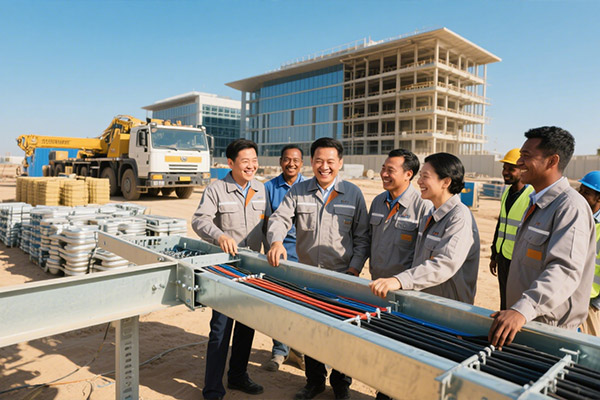Hengshui – Beijing Hebei Yidian Import and Export Trading Co., Ltd. and the School of Materials Science and Engineering of Beijing University of Chemical Technology held a strategic cooperation signing ceremony today, officially launching the construction of the “Polymer Anticorrosion Materials Joint Laboratory”. As a deep cooperation between a national-level specialized and new enterprise and a “double first-class” university, the two parties will focus on the technical bottlenecks of cable tray materials in extreme environments such as marine engineering and high-cold areas, and launch a five-year joint research.
The laboratory will focus on breakthroughs in two major technical directions:
The laboratory will focus on breakthroughs in two major technical directions:
Marine engineering chloride ion corrosion resistant materials: Develop graphene-modified epoxy resin-based composite materials for scenarios such as South China Sea oil and gas platforms and cross-sea cable projects, aiming to reduce the corrosion rate of bridges in 3.5% sodium chloride solution to below 0.01mm/a, 5 times higher than existing products;
Anti-frost heave material system in high-cold areas: Study the freeze-thaw cycle performance of nano-scale expanded perlite-filled polymer materials, and achieve a volume expansion rate of less than 0.3% at -60℃ through micro-pore structure regulation, solving the problem of cracking of traditional materials in the Arctic Circle, Siberia and other regions.
Anti-frost heave material system in high-cold areas: Study the freeze-thaw cycle performance of nano-scale expanded perlite-filled polymer materials, and achieve a volume expansion rate of less than 0.3% at -60℃ through micro-pore structure regulation, solving the problem of cracking of traditional materials in the Arctic Circle, Siberia and other regions.
The two parties plan to complete the industrialization transformation of three core technologies within three years and form a matrix of extreme environment bridge products with independent intellectual property rights. The first batch of results will be applied to the cable laying system of the wind power project in Russia’s Yamal Peninsula.
High-end equipment empowers and creates an industry innovation highland
The laboratory is equipped with scientific research equipment with a total value of over RMB 8 million, including:
Scanning electron microscope (SEM): with a resolution of 1nm, used to analyze the microscopic fracture mechanism of materials;
Salt spray corrosion test chamber: can simulate the C5-M grade high corrosion environment under ISO 9227 standard;
High and low temperature alternating test chamber: temperature range – 70℃~150℃, supports freeze-thaw cycle test of ASTM D6701 standard.
Salt spray corrosion test chamber: can simulate the C5-M grade high corrosion environment under ISO 9227 standard;
High and low temperature alternating test chamber: temperature range – 70℃~150℃, supports freeze-thaw cycle test of ASTM D6701 standard.
“The basic research accumulation of Beijing University of Chemical Technology in the field of polymer materials complements Yidian’s engineering application capabilities.” Dr. Wang, director of the laboratory and professor of the School of Materials Science and Engineering of Beijing University of Chemical Technology, said, “We will establish a full-chain mechanism of ‘basic research – pilot verification – industrial transformation’ to ensure that the scientific research results are ‘grounded and can be implemented’.”
Strengthening the technological moat to support globalization strategy
This cooperation is a key layout of Yidian’s “technology first” strategy. As the company’s overseas business accounts for 45%, extreme environment projects such as wind power in the Arctic Circle and petrochemicals in the Middle East have put forward higher requirements for material performance. The establishment of the joint laboratory will help companies break the monopoly of European and American companies in the field of special materials. For example, the price of a similar product of a certain American brand in the Arctic region is 2.3 times that of Yidian’s existing products. After the technological breakthrough, it is expected to achieve a 40% cost reduction with the same performance.
“Our goal is not only to solve technical problems, but also to establish China-led extreme environment material standards.” The company’s technical director revealed that the laboratory has participated in the work of the Bridge Materials Subcommittee of the ISO/TC 268 International Organization for Standardization, and plans to promote the inclusion of three Chinese proposals in the draft international standards.
This industry-university-research cooperation marks the transformation of China’s cable tray industry from “manufacturing-driven” to “innovation-driven”, providing reliable domestic technical solutions for extreme environment projects along the “Belt and Road”. It is expected to drive the annual overseas revenue of related products to grow by more than 60 million yuan.
About the Joint Laboratory
The two parties will adopt a “dual director system” management model, with Beijing University of Chemical Technology responsible for basic theoretical research and Yidian providing an engineering verification platform and industrialization funds. The laboratory will set up an open project fund and recruit young scientific research teams from around the world every year to promote cutting-edge exploration in the field of polymer anti-corrosion materials.



